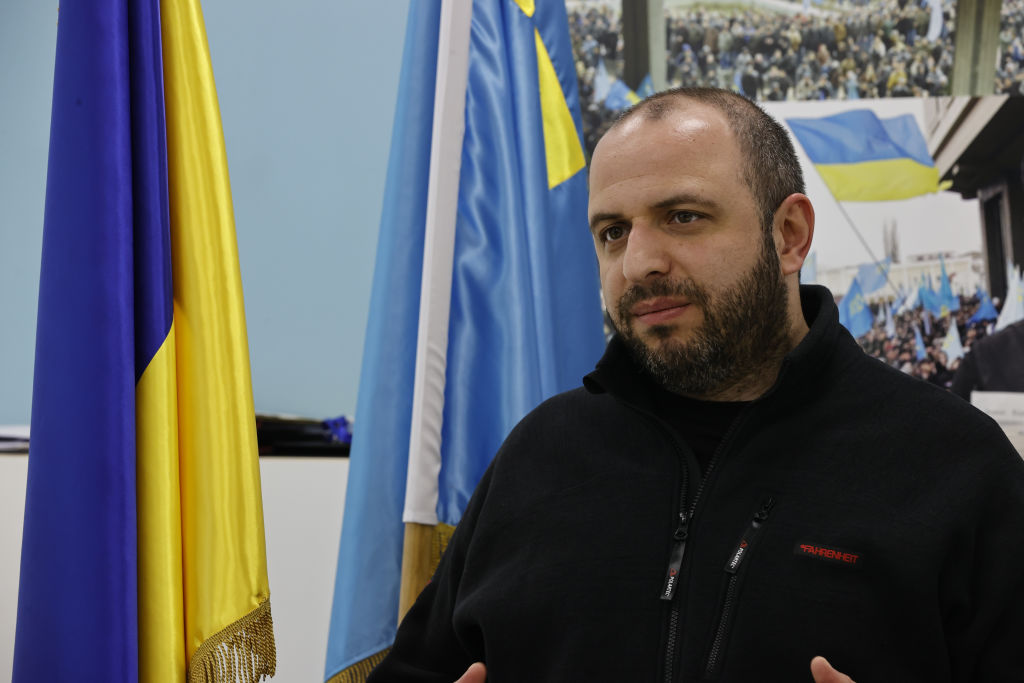
After 18 months of being a prominent fixture in Ukraine’s war efforts, defense minister Oleksii Reznikov has been dismissed from his role amid the biggest leadership shakeup since Russia’s full-scale invasion of Ukraine.
On Sunday, President Volodymyr Zelensky announced the departure, citing the ministry’s need for “new approaches and other formats of interaction with both the military and society at large.” Zelensky has nominated Rustem Umerov—a leading figure in the Crimean Tatar community and head of the country’s State Property Fund—for the role. Reznikov confirmed that he had sent his resignation to the parliamentary chairman and Zelensky has called on the Ukrainian Parliament to approve the bid quickly.
Experts tell TIME that the decision was a long time coming. “This is neither surprising nor a major criticism in any way of the former defense minister,” says Olga Onuch, a professor who focuses on Ukraine at the University of Manchester. “It was going to be unsustainable to keep him on much longer but he was very capable.”
The defense ministry under Reznikov’s watch has incurred a number of scandals relating to procurement and profiteering, though there was no evidence to implicate Reznikov himself, the New York Times reported.
Read More: Inside the Race to Arm Ukraine Before Its Counteroffensive
Reznikov’s dismissal also comes at a critical time for Ukraine’s months-long counteroffensive. Ukrainian troops are fighting to turn a minor breakthrough into a major one in the south, after forces recently broke through a second line of Russian defenses in the Zaporizhzhia area.
As Ukraine adjusts to a change in military leadership, here’s what to know.
More From TIME
What triggered the reshuffle?
The shakeup is the result of a number of factors. It comes at a “critical time as Ukraine is trying to uphold Western military assistance to push forward the counteroffensive,” says Jaroslava Barbieri, a doctoral researcher in Ukrainian politics at the University of Birmingham.
Additionally, some called for Reznikov’s resignation in the wake of a contracting scandal. In August, Zelensky fired all regional military recruitment bosses amid allegations of bribery and corruption across multiple departments. Reznikov's deputy, Vyacheslav Shapovalov, was forced to resign after signing food contracts for military rations at inflated prices.
At the time, Reznikov dismissed the allegations as a technical error. After speaking of the toll the scandal took on him, he said that, "My conscience is absolutely clear."
Yet Barbieri says that“Zelensky’s decision is a signal to the Ukrainian public and Western leaders that the government listens to public concerns over corruption and is serious about its commitment to Ukraine's future within the E.U. and NATO.”
Reznikov himself is also reported to have expressed a desire to step down from the role, according to the New York Times.
What is Reznikov’s legacy?
Reznikov has become a widely-recognizable figure since his appointment in November 2021, and is known for being a shrewd negotiator. During his tenure, he helped to secure billions of dollars worth of military aid from a number of global allied nations, and under his guidance, Ukraine upgraded Soviet-era arms for sophisticated Western systems, tanks, and artillery.
“He did a very good job in his post, surprising many skeptics and other observers that were not so certain when his appointment came about, specifically amongst the opposition,” Onuch says.
Read More: How the Ukraine Counteroffensive Can Still Succeed
While Reznikov has not confirmed his next move, Reuters reported that he is tipped to take on the role of Ukraine’s ambassador to London.
Who is Rustem Umerov?
Rustem Umerov, 41, has held a number of roles in Zelensky’s government, and has served as head of the State Property Fund since last September. Hailing from the Crimean Tatar community—a minority ethnic group of Turkic people from the Black Sea Ukrainian peninsula, which was annexed by Russia in 2014—Umerov was born in Uzbekistan to a family that was exiled from Soviet Crimea in the 1940s.
After getting his start in telecommunications and investment banking, Umerov turned his hand to politics in 2019. He is a member of an opposition political party, and has served as chief negotiator in the Black Sea Grain initiative, which Russia has since pulled out of. He has also been privy to a number of prisoner exchanges and evacuations of civilians.
Experts say his appointment has symbolic and real significance. “His appointment as Minister of Defense symbolizes Ukraine’s commitment to restoring Ukraine’s control over its 1991 borders,” Barbieri says, adding that it sends the message that Crimea will not become a “bargaining chip” in war efforts.
What would Umerov's appointment mean for the counteroffensive?
Umerov’s expected appointment is taking place at a pivotal moment. His background in economics and political negotiation is likely to be a source of strength for the defense ministry. As the counteroffensive continues, Ukraine will seek continued financial and military aid from allies and Umerov is expected to play an integral role in securing new deals.
Umerov has shown himself to have “civic credentials,” Onuch says, from his role in the Ukraine’s parliament to sponsoring a Stanford University program to raise young leaders.
“He is very quickly developing as somebody that is capable and efficacious,” Onuch says. “[He is] able to work across different political factions that have been extremely divided and polarized over the last few years.”
More Must-Reads From TIME
- The 100 Most Influential People of 2024
- How Far Trump Would Go
- Scenes From Pro-Palestinian Encampments Across U.S. Universities
- Saving Seconds Is Better Than Hours
- Why Your Breakfast Should Start with a Vegetable
- 6 Compliments That Land Every Time
- Welcome to the Golden Age of Ryan Gosling
- Want Weekly Recs on What to Watch, Read, and More? Sign Up for Worth Your Time
Write to Armani Syed at armani.syed@time.com